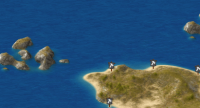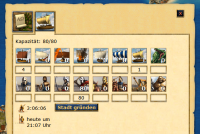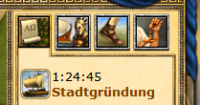Colonising
Description
To found or colonise is one of the methods to obtain a new city in Grepolis. It is the only method that does not change dependent to world settings, in other words it does not matter if you are in a Conquest or Revolt "Colonizing" is done the same way.
It is a non-violent method, because you create a new city rather than take it from another player. A city created by Colonizing will start out with 750 points and will have:
- Timber camp: level 15
- Quarry: level 15
- Silver mine: level 12
- Senate: level 10
- Farm: level 10
- Warehouse: level 10
- Wall: level 2
- Cave: level 2
- Barracks: level 4
However the city will not start out with any soldiers.
Settlement Sites
Whilst exploring the World Map you may have already noticed some grey banners. These banners mark places where you are able to establish a new city.
The islands Grepolis provides for founding new cites do not have Farming villages on them, thus growing is a slow process that will require high resource buildings as well as sending resources with a Market from you main city. Keep in mind that once you found a new city you cannot demolish it if you change your mind.
However when a player has gone inactive after 14 days his ghost town turns in to a "gray banner" suitable for colonizing, this are the sites generally preferred when colonizing because they do have Farming villages as well as other human players that can be raided to gain resources.
Requirements
Buildings
Units
To found a city you require a Colony Ship (also referred to as a CS). This can be built in the Harbour once it has been researched, and will cost
Culture
You must also have sufficient Culture Points to found a new city. For your second city, this is free, but each one after that costs points.
The Process of Colonising
Once you have met all the requirements, it is easy to begin founding your new city.
- First find a suitable place you wish to colonise. It is preferable to find a location relatively close to your first city so your Colony Ship doesn't have to travel too far. Note that if it's more than 48 hours from the CS' base city, you cannot colonise.
- Begin by clicking on your selected site and going to the "Found a new city" tab.
- Select the units you wish to sail to the city. In addition to the Colony Ship you will need to send both land & sea units to escort the Colony ship (this is not optional). Remember that Transport Ships or Fast Transport Ships are needed to send the Land units.
The units sent along escorting the Colony Ship are just to accompany the ship in the voyage, once the city has been founded those troops will not be available to be used by the new city as they still belong to the city that created them (you can summon them back by clicking in your Agora then clicking the tap labeled "Outside").
- Once you are done press the Establish City button and your fleet will set sail.
Depending on the distance between your cities it may take a while for your fleet to arrive. Once they do arrive you will receive a report, and the troops aboard your Colony Ship will automatically begin constructing the first buildings in your new city; this will take 24 hours (no matter what speed), and the resources for the building are included in the cost of the Colony Ship.
When the construction is completed you will be alerted in the City Overview.
Congratulations - you now have a second city!
Colonizing as a tool in Grepolis
Colonising is sometimes frowned upon as a way of getting a second city by Veteran players, This is because some may feel that you can gain a much larger second city by conquering, at the expense of a few day wait. However, by colonising, you are guaranteed a second city. Other players feel that by the time they are able to conquer a city (as they need an academy lvl 28, research conquest, a rather large land & sea army and a suitable target) they can get a Founded city up and running.



